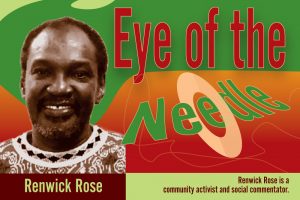Dr. Keith Mitchell – How best to utilize elder statesmen?

Dr Keith Mitchell, who up to his defeat in the recent general elections in Grenada was the Caribbean’s longest-serving Prime Minister being in that office for 22 years, albeit not continuously, has been sworn in as leader of the Opposition in his country.
In comments after his swearing-in, he promised to play a constructive role in helping to guide his country on the path of development. Significantly,in his remarks he referred to his new role as being “for now”, a thinly disguised hint that he is contemplating his exit from the political stage.
Dr. Mitchell will be 76 if he is around in November and clearly cannot be contemplating a return to the Prime Minister’s role, given the fact that new P.M., Dickon Mitchell is more than three decades his junior. So it begs the question, what role can elder statesmen like these play when they demit, or are forced to demit political office?
It is an issue relevant not just to Grenada but to the Commonwealth Caribbean and its inherited Westminster parliamentary system. The current Prime Minister of St Vincent and the Grenadines is of the same age as Dr Mitchell. The P.M. of Trinidad and Tobago is but three years younger than these two and, for instance, if the current Prime Minister of St. Lucia serves for two terms, he will be 77 years old at his departure.
Our current political system is such that there is no constitutional role for benefiting from the considerable experience of such elder statesmen.
They are largely left either to play obstructionist roles, as the late Sir James Mitchell did in SVG’s constitutional reform process just over a decade ago or left to rot, politically speaking.
But can’t Caribbean countries find a constitutional role for these elder statesmen, allowing them to contribute to national development in a non-partisan way and helping to unify their peoples rather than perpetuate the political divisions?
It would be interesting to revisit a proposal put forward by the Constitutional Review Commission in St Vincent and the Grenadines during the 2003-2009 constitutional reform process. It pertains to the proposed establishment of a National Advisory Council of Elders (NACE).
The thinking behind it was that, given the chronic scarcity of human resources in small countries like ours, and the tendency not to provide meaningful roles for persons who had retired with years of valuable experience, some attempt should be made to harness their considerable talents in the national interests. The CRC expressed the view that “there is much to be gained from the setting up of a constitutional mechanism for the harnessing of the wisdom of those who have provided public service at reasonably high levels”, in what the Commission stated should be
“a non-partisan environment”.
The idea was for the establishment “of a deliberative, non-legislative body” called NACE with specific target membership and roles. The proposal was for two categories of membership- (1) Members as of right such as former Heads of State and Government; and (2) Persons selected by parliament drawn from categories such as former members of the judiciary, legal fraternity and law enforcement officers; former diplomats; former Members of Parliament; experienced civil society and religious leaders.
Specific responsibilities were laid out, including:
(a) The vetting of persons for the position of Head of State so as to provide recommendations to Parliament for the selection of the appropriate choice;
(b) Taking over the responsibilities of the Committee on the prerogative of mercy (the Mercy Committee);
(c) Making recommendations to Parliament for the selection of Chairpersons of the public Service Commission and its appellate body;
(d) Advising the Head of State on the selection of such critical appointments as the Chairman of the Constituency Boundaries Commission and the Supervisor of Elections.
In addition to these important roles, bringing a non-partisan focus to selection, it was also proposed that NACE could be used as an advisory body,providing recommendations on national matters referred to it by the Head of State, Prime Minister,Parliament and Leader of the Opposition.
These ideas which did not find favour in the partisan atmosphere, into which the constitutional free form process sank, should not be left to expire.
Thus, suppose for instance, current P.M. Gonsalves were to contest and lose the next election, should the country as a whole not have the benefit of his not inconsiderable experience, rather than him concentrating his efforts on narrow partisan tasks?
Is it not better for Grenada to get Dr Mitchell’s wisdom and guidance on matters of national importance, even when he may disagree with his own party, rather than taking a narrow “kokey-eyed” view of issues?
It is time we lift our thinking beyond the two-party divisions and reflect on how we can provide institutions and mechanisms for placing our countries first. Please chew on it.
Renwick Rose is a community activist and social commentator.










